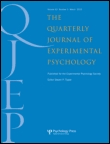
EMOTION
Scope & Guideline
Decoding the Complexities of Emotion
Introduction
Aims and Scopes
- Interdisciplinary Approaches to Emotion Research:
The journal publishes studies that integrate various disciplines, including psychology, neuroscience, and sociology, to provide a comprehensive understanding of emotions. - Empirical Investigations of Emotion Dynamics:
Research focusing on the dynamics of emotional experiences, including how emotions evolve over time and influence behavior in different contexts. - Cognitive and Affective Interactions:
Exploration of the interplay between cognitive processes and emotional responses, including how emotions influence decision-making and memory. - Emotion Regulation Strategies:
Studies examining various strategies individuals use to manage their emotions and the impact of these strategies on mental health and well-being. - Cultural and Social Contexts of Emotion:
Research that investigates how cultural and social factors shape emotional experiences and expressions, emphasizing the importance of context in understanding emotions. - Developmental Aspects of Emotion:
Exploration of how emotional processes develop across the lifespan, including the influence of early experiences on later emotional functioning.
Trending and Emerging
- Impact of Technology on Emotion:
An increasing focus on how technology, including social media and virtual interactions, affects emotional experiences and expressions, particularly during the COVID-19 pandemic. - Complex Emotional States and Mixed Emotions:
Research exploring the complexities of emotional experiences, including mixed emotions and ambivalence, which are becoming prominent in understanding emotional responses. - Emotion in Contextual and Social Dynamics:
A trend towards examining emotions in social contexts, emphasizing the role of interpersonal relationships and situational factors in shaping emotional experiences. - Emotion Regulation and Mental Health:
Growing interest in the relationship between emotion regulation strategies and mental health outcomes, particularly in clinical populations. - Cultural Variability in Emotion:
Research focusing on how cultural differences influence emotional expression, perception, and regulation, highlighting the importance of cultural context in emotional studies. - Ecological Momentary Assessment (EMA):
An increasing trend towards using EMA methods to capture real-time emotional experiences and fluctuations in daily life, providing a more nuanced understanding of emotions.
Declining or Waning
- Basic Emotion Theories:
The focus on foundational theories of basic emotions, such as Paul Ekman's work, has diminished as the journal shifts towards more complex and nuanced understandings of emotional processes. - Neurological Studies of Emotion:
Although neurological studies have been a significant part of emotion research, recent publications indicate a decline in this area, possibly due to a growing interest in behavioral and contextual factors over purely biological explanations. - Static Models of Emotion:
Research that treats emotions as static or binary constructs is becoming less common, with a shift towards dynamic models that account for the fluidity of emotional experiences. - Emotion Measurement Tools:
The use of traditional self-report measures for assessing emotions appears to be waning as researchers explore more innovative and context-sensitive methodologies.
Similar Journals

QUARTERLY JOURNAL OF EXPERIMENTAL PSYCHOLOGY
Transforming Understanding Through Empirical StudiesQuarterly Journal of Experimental Psychology, published by SAGE Publications Ltd, is a leading peer-reviewed journal that serves as a vital resource in the fields of experimental and cognitive psychology, neuropsychology, and medicine. With an impactful contribution to psychological research, the journal is recognized for its rigorous methodology and empirical studies, holding a notable ranking among its peers—finding itself in the Q2 quartile across several categories. With its origin tracing back to 2006, Quarterly Journal of Experimental Psychology significantly influences the academic discourse until its latest published findings in 2024. Catering to a diverse audience of researchers, professionals, and students, this journal provides Open Access options, enhancing the reach and accessibility of cutting-edge psychological research. By focusing on innovative approaches and findings, it aims to bridge theoretical understanding with practical application, hence fostering advancement in multiple related disciplines. For those committed to understanding the complexities of human behavior and cognitive processes, this journal remains an essential reference point.

JOURNAL OF PSYCHOPHYSIOLOGY
Pioneering Research in Neuropsychology and BeyondJOURNAL OF PSYCHOPHYSIOLOGY, published by Hogrefe Publishing Corp, serves as a crucial platform for the dissemination of research in the interdisciplinary fields of neuropsychology, physiological psychology, and neuroscience. With an ISSN of 0269-8803 and an E-ISSN of 2151-2124, this journal has been a staple in the academic community since its inception in 1987 and will continue to publish impactful research until at least 2024. Despite the absence of Open Access, the journal maintains a significant presence, holding Q3 and Q4 quartile rankings in relevant disciplines according to the 2023 metrics. Researchers and practitioners benefit from the journal's robust focus on integrating psychophysiological research with practical applications, contributing to a better understanding of psychological processes through physiological insights. As evident from its Scopus rankings, the JOURNAL OF PSYCHOPHYSIOLOGY is dedicated to fostering scholarly dialogue and advancing knowledge in the field, making it an essential resource for anyone invested in the intricacies of human behavior and the physiological underpinnings thereof.

EXPERIMENTAL PSYCHOLOGY
Pioneering the future of psychology with open access knowledge.EXPERIMENTAL PSYCHOLOGY is a premier journal dedicated to advancing the field of psychology through rigorous empirical research and innovative theoretical insights. Published by HOGREFE PUBLISHING CORP, this esteemed journal features an array of studies that delve into cognitive processes, experimental methodologies, and the intricate workings of human behavior. With a significant impact factor, EXPERIMENTAL PSYCHOLOGY holds a Q1 ranking in Arts and Humanities and maintains a commendable presence in the realms of Experimental and Cognitive Psychology. By providing Open Access options, the journal ensures that vital psychological research is widely accessible, fostering collaboration and knowledge sharing among researchers, practitioners, and students worldwide. Based in the United States, it has been a cornerstone of psychological literature since 1998, continuing to shape the discourse in its diverse and interdisciplinary scope. Researchers seeking to contribute to or stay informed about the latest advancements in psychological science will find EXPERIMENTAL PSYCHOLOGY an invaluable resource.

PSYCHOLOGICAL REVIEW
Driving Critical Analysis in Psychological Research.PSYCHOLOGICAL REVIEW, published by the American Psychological Association, stands as a premier journal within the field of psychology, boasting an impressive track record since its inception in 1894. With an impressive impact factor and a distinguished position in Q1 quartiles for both History and Philosophy of Science and Miscellaneous Psychology, this journal is recognized as a leading source of innovative research and critical analysis. Consistently ranked in the top tier, it holds the 17th position out of 216 in general psychology according to Scopus, reflecting its significance and the high caliber of scholarly contributions it features. While the journal is not open access, it provides comprehensive insights geared towards researchers, professionals, and students keen to deepen their understanding of psychological theories and practices. With a commitment to fostering intellectual discourse, PSYCHOLOGICAL REVIEW is essential for anyone engaged in the evolving landscape of psychological research.

BIOLOGICAL PSYCHOLOGY
Illuminating the Links Between Brain and BehaviorBIOLOGICAL PSYCHOLOGY is a prominent academic journal published by Elsevier, recognized for its critical contributions to the fields of neuropsychology and physiological psychology. With a steadfast publication history since 1973, it has established itself as a vital resource for researchers, professionals, and students interested in the intricate connections between biological processes and psychological phenomena. As evidenced by its esteemed 2023 Q1 ranking in Neuropsychology and Physiological Psychology and Q2 in Neuroscience (miscellaneous), this journal occupies a prestigious position in the academic community, fostering innovative research and scholarly discourse. The journal offers a rigorous platform for the publication of empirical studies, theoretical articles, and reviews that illuminate the relationship between brain function and behavior. Although Open Access options are not available, readers can benefit from robust subscription access to its cutting-edge content. With an increasing focus on interdisciplinary approaches, BIOLOGICAL PSYCHOLOGY aims to advance understanding in a rapidly evolving field, making it an essential reference for those at the forefront of psychological and neuroscientific research.

JOURNAL OF PERSONALITY AND SOCIAL PSYCHOLOGY
Advancing Insights into Personality DynamicsJournal of Personality and Social Psychology, published by the American Psychological Association, stands as a premier resource in the fields of social psychology and sociology, offering critical insights into the dynamics of human behavior and interpersonal relationships. With an impressive impact factor and ranked in the top tier of academic journals—Q1 in both Social Psychology and Sociology & Political Science—it consistently attracts high-caliber research submissions that advance theoretical and practical knowledge. Established in 1965, this journal has become a cornerstone for scholars and practitioners alike, facilitating the dissemination of pivotal studies in understanding social influences and individual personalities. As a key player in its field, it is essential reading for anyone involved in psychological research, providing a platform for innovative ideas and comprehensive analyses. Despite its subscription-only access model, its influence is reinforced by its consistently high rankings on Scopus, underscoring its significance by being in the 98th percentile for sociology and the 97th percentile for social psychology. Academics looking to delve into transformative concepts around personality and social interactions will find Journal of Personality and Social Psychology an invaluable addition to their resources.

VOPROSY PSIKHOLOGII
Bridging Theory and Practice in PsychologyVOPROSY PSIKHOLOGII, a prominent journal in the field of psychology, has been publishing insightful research since its inception in 1960. With a focus on various aspects of psychological research, this journal offers a platform for the dissemination of knowledge and advancements in the discipline within the Russian Federation and beyond. Published by MEZHDUNARODNAYA KNIGA, the journal provides access to a diverse range of studies and theoretical discussions, although it currently does not offer open access. As of 2023, it holds a category quartile ranking of Q4 in miscellaneous psychology, reflecting its niche position within the broader psychological community. Despite its lower Scopus rank at #206 out of 216, the journal remains a valuable resource for students, researchers, and professionals seeking to engage with emerging trends and ideas in psychology. VOPROSY PSIKHOLOGII continues to contribute significantly to the academic dialogue, inviting engagement from scholars dedicated to exploring the complexities of human behavior.

Cognitive Neuropsychiatry
Elevating Discourse: High-Quality Research on Cognitive DisordersCognitive Neuropsychiatry is a distinguished academic journal published by Routledge Journals, Taylor & Francis Ltd, dedicated to the intersection of cognitive neuroscience and psychiatry. With a strong commitment to advancing knowledge in these rapidly evolving fields, this journal provides a platform for high-quality, peer-reviewed research that explores cognitive processes underlying psychiatric disorders. Aiming to bridge gaps between neuroscience and clinical practice, it serves as an essential resource for researchers, professionals, and students alike. As evidenced by its performance metrics, the journal ranks in the Q2 quartile for Psychiatry and Mental Health, and Q3 for Cognitive Neuroscience, showcasing its relevance and growing impact, particularly among a competitive audience. While it does not currently offer open access options, Cognitive Neuropsychiatry remains a vital outlet for disseminating impactful findings, offering insights that shape contemporary psychiatric understanding and interventions.

BEHAVIOUR RESEARCH AND THERAPY
Transforming Understanding through Innovative Therapy Studies.Behaviour Research and Therapy, published by Pergamon-Elsevier Science Ltd, stands as a pivotal journal in the realm of clinical, developmental, and cognitive psychology. With a distinguished history dating back to 1963, this esteemed journal has continuously provided a vital platform for groundbreaking research focused on understanding and treating psychological disorders. It holds an impressive impact factor and is categorized in the Q1 quartile across multiple domains including Clinical Psychology, Developmental and Educational Psychology, Experimental and Cognitive Psychology, and Psychiatry and Mental Health. With its Scopus ranking placing it in the top percentiles of its field, Behaviour Research and Therapy serves as an essential resource for researchers, professionals, and students seeking to remain at the forefront of psychological science. While it operates under a traditional subscription model rather than an open access framework, its contributions are invaluable for advancing our understanding of behavior and therapeutic interventions.

JAPANESE PSYCHOLOGICAL RESEARCH
Innovating Research in the Heart of Japan's PsychologyJapanese Psychological Research, published by Wiley, is a distinguished journal dedicated to advancing knowledge within the field of psychology, offering a platform for original research that reflects the diverse psychological landscape of Japan and its global relevance. Since its inception in 1954, this journal has served as a valuable resource for researchers, professionals, and students alike, encouraging the dissemination of innovative theoretical and empirical findings. With an Impact Factor that places it in the Q3 category in Psychology (Miscellaneous) and achieving a rank of #125 out of 216 in general psychology according to Scopus, it is recognized for its contribution to the scholarly community. Although it does not currently offer Open Access options, the journal's rich archive from 1954 to present ensures a comprehensive collection of psychological studies. Engage with Japanese Psychological Research to explore insights into behavioral science, cognitive processes, and cultural influences on psychological practices, making it an essential read for those committed to understanding the multifaceted world of psychology.